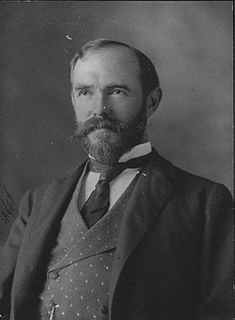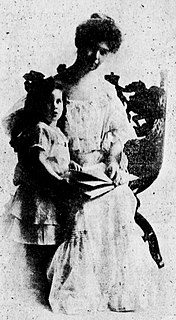Related Research Articles

Walter Francis Dillingham called the Baron of Hawaii Industry, was an industrialist and businessman from Honolulu, Hawaii. He gained favors from Hawaii politicians to develop urban Honolulu.

Walter Francis Frear was a lawyer and judge in the Kingdom of Hawaii and Republic of Hawaii, and the third Territorial Governor of Hawaii from 1907 to 1913.

Herbert Kawainui Kāne, considered one of the principal figures in the renaissance of Hawaiian culture in the 1970s, was a celebrated artist-historian and author with a special interest in the seafaring traditions of the ancestral peoples of Hawaiʻi. Kāne played a key role in demonstrating that Hawaiian culture arose not from some accidental seeding of Polynesia, but that Hawaiʻi was reachable by voyaging canoes from Tahiti able to make the journey and return. This offered a far more complex notion of the cultures of the Pacific Islands than had previously been accepted. Furthermore, he created vivid imagery of Hawaiian culture prior to contact with Europeans, and especially the period of early European influence, that sparked appreciation of a nearly forgotten traditional life. He painted dramatic views of war, exemplified by The Battle at Nuʻuanu Pali, the potential of conflicts between cultures such as in Cook Entering Kealakekua Bay, where British ships are dwarfed and surrounded by Hawaiian canoes, as well as bucolic quotidian scenes and lush images of a robust ceremonial and spiritual life, that helped arouse a latent pride among Hawaiians during a time of general cultural awakening.
Theo H. Davies & Co. is a company that was one of the Big Five trading and agricultural companies in the Territory of Hawaii.

The Foundation for Economic Education (FEE) is a libertarian economic think-tank in the United States dedicated to the "economic, ethical and legal principles of a free society." FEE publishes books, daily articles, and hosts seminars and lectures.
The William Volker Fund was a charitable foundation established in 1932 by Kansas City, Missouri, businessman and home-furnishings mogul William Volker. Volker founded the fund with the purposes of aiding the needy, reforming Kansas City's health care and educational systems, and combating the influence of machine politics in municipal governance. Following Volker's death in 1947, Volker's nephew, Harold W. Luhnow continued the fund's previous mission, but also used the fund to promote and disseminate ideas on free-market economics. During Luhnow's tenure as the fund's primary manager, the William Volker Fund was one of the few libertarian organizations with significant amounts of money at its disposal, making it a key leader in developing the modern libertarian and conservative movements in the United States.
Loren Miller was a civic reformer and libertarian activist in the first half of the 20th century. Perhaps Miller's most lasting contribution was his success in convincing business magnates to support libertarian causes and organizations. The most notable case was William Volker who, at Miller's suggestion, founded the William Volker Fund in 1932. Other examples included Jasper Crane of DuPont; B. E. Hutchinson of Chrysler; Henry Weaver of General Electric; Pierre Goodrich, the Indianapolis businessman and creator in 1960 of Liberty Fund; Richard Earhart, founder of the Earhart Foundation; and Harold Luhnow of the Volker Fund.

The Oahu Railway and Land Company, or OR&L, was a 3 ft narrow gauge common carrier railway that served much of the Hawaiian island of Oahu, and was the largest narrow gauge class one common carrier in the U.S, until its dissolution in 1947.

Benjamin Franklin Dillingham was a businessman and industrialist during the late Kingdom of Hawaii era, throughout the period of the Republic of Hawaii, and during the first two decades of the Territory of Hawaii.
La Pietra: Hawaii School for Girls, also referred to as La Pietra or Hawaii School for Girls, is a private school for girls in grades 6–12 located in Honolulu, Hawaii. Founded in 1964 by Lorraine Cooke, it moved to the current La Pietra campus in 1969. Barbara Cox Anthony chaired the school's board of trustees until her death in 2007. The school is at the foot of Diamond Head. The main building was designed by Chicago architect, David Adler and was modeled after an Italian villa in Florence, Italy of the same name.

Henry Ernest Cooper was an American lawyer who moved to the Kingdom of Hawaii and became prominent in Hawaiian politics in the 1890s. He formally deposed Queen Lili'uokalani of Hawaii in 1893, held various offices in the ensuing Provisional Government of Hawaii and Republic of Hawaii governments, and was the first United States Territory of Hawaii Attorney General, 1899–1900. He later became a circuit judge in Honolulu.
Barack Obama, the 44th president of the United States, was born on August 4, 1961 in Honolulu, Hawaii to Barack Obama, Sr. (1936–1982) and Stanley Ann Dunham, known as Ann (1942–1995). So far, he is the only president to have been born in the 1960s.

William Herbert Shipman (1854–1943) was a wealthy businessman on the island of Hawaii. One estate of his family was used to preserve an endangered species of Hawaiian goose. A historic house associated with his family for over a hundred years is called the W. H. Shipman House in Hilo, Hawaii. Another of his historic estates called the Ainahou Ranch, built in 1941 as a refuge from World War II, is preserved within Hawaii Volcanoes National Park.

Richard Charles Cornuelle was a political activist, charity worker, author, and one of the first modern American libertarians.

Joseph Apukai Akina was a lawyer, politician and minister of the Kingdom of Hawaii and later Territory of Hawaii. He served as a statesman during the reign of Queen Liliʻuokalani and later became the first Speaker of the House of Representatives in the Hawaii Territorial Legislature.

Mary Emma Dillingham Frear was First Lady of the Territory of Hawaii from 1907 to 1913, and was a regent of the University of Hawaii for two decades. The granddaughter of missionaries, she was the first Hawaii-born wife of a governor of Hawaii.
References
- ↑ Fox, Margalit (2011-05-03). "Richard Cornuelle, Libertarian Author, Dies at 84". The New York Times . Retrieved 2012-11-06.(subscription required)
- ↑ "Obituaries". Archives.starbulletin.com. 1996-08-22. Retrieved 2012-11-06.
- ↑ "Deaths – Orlando Sentinel". Articles.orlandosentinel.com. 1996-08-23. Retrieved 2012-11-06.
- ↑ "Herb Cornuelle". SourceWatch. 2004-06-15. Retrieved 2012-11-06.
- ↑ "Celebrating 150 Years". The Honolulu Advertiser. Retrieved 2012-11-06.